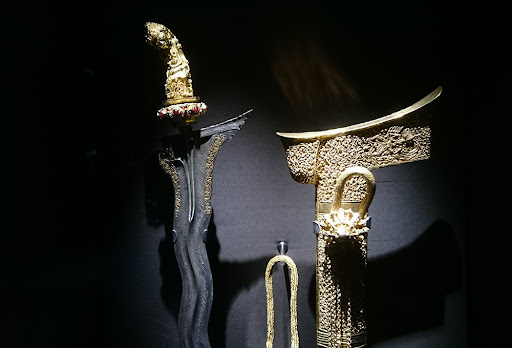
Robert Draws – Pucangan Inscription and Kris Pusaka—two invaluable cultural treasures—have become central to Indonesia’s push for the repatriation of its heritage from abroad. As the newly established Ministry of Culture begins its activities in 2025. These artifacts are among the top priorities for return. Minister of Culture Fadli Zon has made it clear that the repatriation of important cultural items. Including the Pucangan Inscription and sacred Kris swords, will be a major part of his agenda. The government has already been working on this effort for decades. It is now accelerating with renewed focus and urgency under Fadli Zon’s leadership.
In a recent statement following the inauguration of key officials at the Ministry of Culture on January 8, 2025. Fadli Zon highlighted the importance of bringing these cultural artifacts back to Indonesia. He emphasized that this initiative is not just about recovering physical items. But also about restoring a part of Indonesia’s cultural and historical identity.
The Pucangan Inscription is one of Indonesia’s most significant cultural relics. Originating from the Majapahit era. It contains an ancient genealogy of the kingdom’s royal family. Including the important rulers like Airlangga and Empu Sendok. Currently held outside Indonesia, is seen as a crucial part of the nation’s historical narrative. Minister Fadli Zon has made it a priority to ensure that the inscription is returned to Indonesia.
Fadli Zon has stated that the Pucangan Inscription will be a key item for discussion during President Prabowo Subianto’s upcoming visit to India. The inscription’s return has long been part of ongoing diplomatic conversations. Now the Indonesian government aims to finalize these talks. “We hope that during President Prabowo’s visit to India, we can discuss the return of the Pucangan Inscription. This inscription is of great importance to us because it contains the genealogical records of the kings of Airlangga and Empu Sendok,” said Fadli Zon. He also mentioned the hope of renewing or expanding memorandums of understanding (MOUs) with countries like the UK and the Netherlands to ensure the return of more cultural artifacts.
The minister stressed that the government is not only working with India but also with countries like the UK and the Netherlands to facilitate the repatriation of various cultural treasures. “We are also in talks with the UK and the Netherlands. Where these important artifacts are currently kept. Our goal is to secure agreements that will allow us to bring these items back,” he added.
“Read about: Danni Febriana’s Artistic Revolution: The Power of Charcoal in Painting
The repatriation of the Pucangan Inscription is just one part of a larger initiative led by the Ministry of Culture. The Ministry plans to identify 800 cultural artifacts that are currently in foreign collections. These items include important Kris swords. Which are highly valued in Indonesian culture and history. Among these, the Keris Teuku Umar, Keris Diponegoro, and various Kris from the Madura Sultanate, Yogyakarta, and Solo are being prioritized for repatriation.
Fadli Zon specifically pointed out the historical significance of these Kris swords. Many of which are believed to have been taken during colonial times. “We are working to bring back historical Kris such as the Keris Teuku Umar, the Keris Diponegoro, and other important ceremonial weapons from regions like Madura, Yogyakarta, and Solo,” said Fadli Zon. These Kris, along with the Pucangan Inscription, are important symbols of Indonesia’s cultural identity. Their return will be a significant step in the country’s efforts to reclaim its lost heritage.
The Ministry of Culture is actively engaging with international governments and institutions to facilitate the repatriation of these items. The minister emphasized that the process of returning these artifacts is not just about recovering physical objects but also about restoring Indonesia’s cultural and historical continuity. “These items are not just historical artifacts; they are symbols of our identity, and we must be prepared to welcome them back,” Fadli Zon concluded.
“Read more: Zendaya and Selena Gomez Shine with Old Hollywood Bob”
Apart from its efforts to repatriate artifacts, the Ministry of Culture is also focused on advancing research and preserving Indonesia’s archaeological sites. Minister Fadli Zon recently visited Gunung Padang. A megalithic site in West Java, to continue research that had previously been halted. The site has been the subject of significant debate within the archaeological community. The Ministry plans to continue its study to fully understand its historical significance.
“There are differing views among archaeologists regarding the significance of Gunung Padang. We plan to bring together these different perspectives in a constructive discussion to determine the best way forward. We will gather our scholars and scientists to debate and collaborate on how to proceed with these studies,” explained Fadli Zon.
This approach reflects the Ministry’s broader commitment to preserving and enhancing Indonesia’s cultural and historical heritage. By continuing research on important sites like Gunung Padang, the Ministry aims to expand the country’s understanding of its ancient history and ensure that future generations can appreciate the richness of Indonesian culture.
Minister Fadli Zon’s focus on repatriating cultural treasures, including the Pucangan Inscription and Kris Pusaka, marks a critical phase in Indonesia’s cultural preservation efforts. As the Ministry of Culture works to identify and return 800 significant artifacts. The country is taking essential steps to restore its national heritage. With ongoing research into sites like Gunung Padang, the future of Indonesia’s cultural legacy is looking brighter. With the return of Pucangan Inscription and Kris Pusaka, It can be playing a central role in reconnecting the nation with its past.